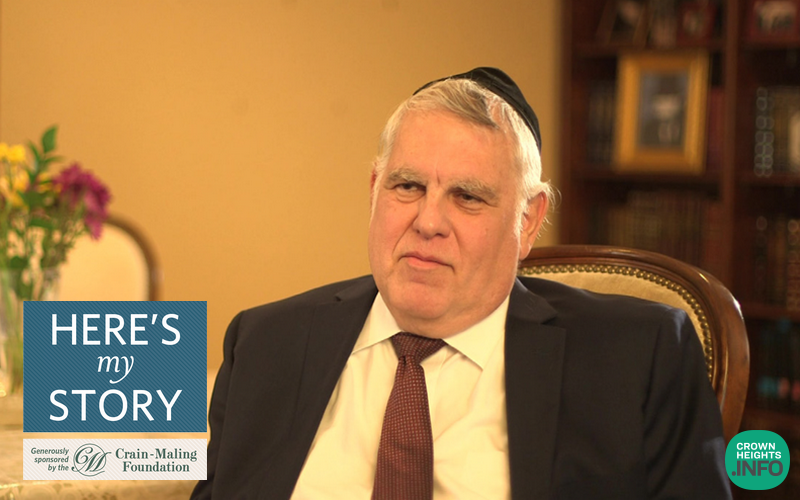
Here’s My Story: The History of My Future
Mr. Reuven Meer
Click here for a PDF version of this edition of Here’s My Story, or visit the My Encounter Blog.
I grew up in Detroit in a non-observant family. My parents did belong to a Conservative synagogue but they rarely went there, and I’d say our relationship with Judaism was generally on the back-burner.
My religious awakening began in 1967. I was 17 at the time, and I was tremendously impressed by Israel’s success in the Six Day War. I was so inspired that I went to our Conservative synagogue, where they had an appeal for Israel, and I pledged $100 (which would be like $1,000 today) in my father’s name. My father did not appreciate my generosity on his behalf and I had to work off some of that pledge myself, but a fire had been lit under me.
The next year, when I went to college — at Michigan State University in East Lansing — I joined Hillel, the Jewish organization on campus, and for the first time met an Orthodox Jew who loaned me some books on basic Judaism. More importantly, I attended an inspiring lecture by the late Rabbi Dovid Lieberman, a Lubavitcher who later became the chief rabbi of Antwerp, and he suggested I visit the Chabad synagogue, Mishkan Israel, on Nine Mile Road in nearby Oak Park. There, with the help of Rabbi Berel Shemtov, I put on tefillin for the first time since my Bar Mitzvah.
Shortly thereafter, I joined a group of Orthodox students affiliated with Young Israel. We successfully petitioned the university to live together off campus so that we could keep kosher. The large house we rented subsequently became a Chabad House, where we kept a Torah scroll and held prayer services with more than three dozen people attending on Shabbat.
In the summer of 1969, I traveled to New York and attended my first farbrengen where I saw and heard the Rebbe, who made a great impression on me, but I did not meet him in private at that time — I felt I wasn’t ready for such a big step. But by next Passover I was, and it proved a momentous occasion for me.
I recall waiting for my turn from about 8 p.m. until about 5 a.m., but meeting the Rebbe was well worth it.
I had no idea what to expect and I did not know that the custom among chasidim is not to sit in the presence of the Rebbe. So, when the Rebbe gestured toward a chair, I sat down. I think he wanted me to feel comfortable, and I did — his smile was so warm and I sensed his goodness.
At the beginning of our conversation, I explained that I was a university student, and I told him about the Jewish activities I was involved in on campus. The Rebbe seemed to approve and said, “I see that you are in a position to influence people.”
I didn’t understand what he meant. I said, “I can’t influence people, Rebbe. I don’t know anything.” This was absolutely true — at the time I didn’t even know what Shavuot was!
But the Rebbe was not deterred. He suggested that it was not necessary for me to be very knowledgeable to have an influence; I simply needed to find answers to the questions people ask. He even joked that this is what he does. “People ask me questions, and I answer their questions,” he said.
I also told the Rebbe that I didn’t know what direction to take in life. I didn’t know if I should stay in college and get my degree, or if I should drop out and enroll in yeshivah.
In response, the Rebbe asked me how much more time I had to put in before getting my degree, and I answered that I was half-way through. He said, “In that case, you should finish your university education, but during your summer and winter breaks, you should attend yeshivah.”
So that is what I did, and even though the breaks lasted only three weeks each, the religious education I received during that time was very significant and kept my life on the right path.
During that audience, the Rebbe also said something that illustrated how well he understood people and human psychology.
He spoke about how people deceive themselves. He used the example of what was happening in America at the time. This was in the aftermath of the race riots that accompanied the Civil Rights Movement and followed the assassination of Dr. Martin Luther King, but instead of dealing with these issues, Americans were focused on sending a man to the moon, the Rebbe said.
“People know what they should do,” he said, “but they delude themselves. They distract themselves with things that are not priorities.”
I try to apply that to my own life. I remember that I really know what I should be concentrating on, so I can make sure I’m not veering in the direction of what’s easier, away from what’s more important.
So that’s how the Rebbe changed my life — one, by advising me that I can always influence people in positive ways; and two, by advising me to recognize what is the real priority for me.
Although fifty years have passed since I met him, the Rebbe’s words of guidance made such an impression on me that they stayed with me all that time, and I hope that they will also similarly impress those who hear them from me.
Mr. Reuven Meer is an attorney living in Oak Park, Michigan. He was interviewed in August 2021.










